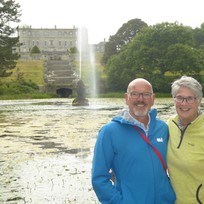( Overview
/ Two Scilly Bullocks on a Boat
Razzmatazz got into a little bit of a pickle moving out of the way so we could leave the pontoon. Help at hand, so hopefully quickly sorted.
Needing to make progress, we shunned Salcombe, and set course for Dartmouth, where it is easier to time an entrance and exit (Salcombe has a bar at its entrance which is governed by tide). It’s also further on, so less distance tomorrow).
Start Point runs sharply almost a mile into the sea on the south side of Start Bay near Dartmouth. The lighthouse - sited at the very end of the headland - guides vessels in passage along the English Channel.
After a sunny day, as we approached Dartmouth Harbour it started to pour with rain - misty rain right in our faces which played havoc with our glasses. Literally not able to see anything, and needing to navigate in, we were the blind leading the blind.
Dartmouth is a very busy harbour, and sometimes even needs tree clearing! We were so worried about not being able to see properly, that when we could make out an anchorage, we decided to anchor, even if only until the rain stopped.
In the mist and rain the river and town didn’t look attractive, so we decided to stay on board. The harbour authority also ask for skippers or competent crews (is that us?) to stay on board through one change of tide. The tides and eddies are not consistent, and boats can swing at different rates.
During the afternoon we could hear the regular toot of a steam train; the Dartmouth Steam Railway is a 6.7-mile (10.8 km) heritage railway on the former Great Western Railway branch line. There is also a steamboat.
We also spotted yachts that had retired from the Fastnet Race. This year was the 50th anniversary of Rolex sponsorship. For a second consecutive occasion, the 695 nautical mile course will finish in Cherbourg-en-Cotentin via the Fastnet Rock. The first race was between 7 yachts in 1925.
Since 1863, Dartmouth and the River Dart have been the home of initial Naval Officer training in the UK. Sir Aston Webb designed the building in 1905, and it is now the only Naval Officer training college in the UK.
As the rain cleared, we were pleased we hadn’t progressed to the picturesque part of the river. The towns were pretty, and it was fun to witness all the comings and goings, and hear the activity in town.
Intrigued to see more, and very settled in our anchorage, we planned to visit another time to explore more.































 Sign in with Apple
Sign in with Apple  Log in with Facebook
Log in with Facebook